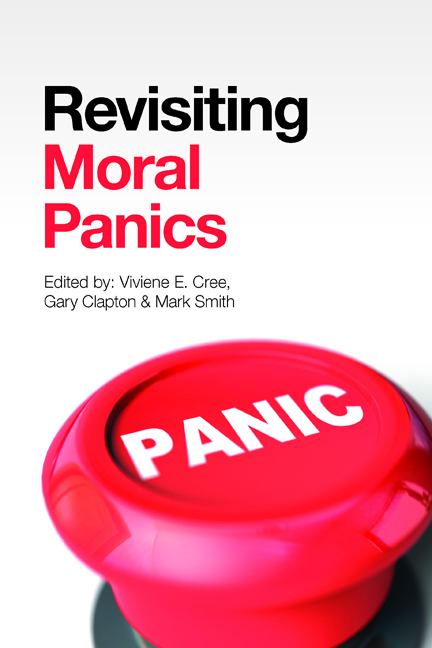Book contents
- Frontmatter
- Contents
- Contributors
- Preface
- Commentary moral panics yesterday, today and tomorrow
- Part One Gender and the family
- Part Two Moral panics in our time? Childhood and youth
- Part Three The state, government and citizens
- Part Four Moral crusades, moral regulation and morality
- Afterword the moral in moral panics
- Conclusion Moral panics and beyond
- Index
Four - The wrong type of mother: moral panic and teenage parenting
Published online by Cambridge University Press: 08 March 2022
- Frontmatter
- Contents
- Contributors
- Preface
- Commentary moral panics yesterday, today and tomorrow
- Part One Gender and the family
- Part Two Moral panics in our time? Childhood and youth
- Part Three The state, government and citizens
- Part Four Moral crusades, moral regulation and morality
- Afterword the moral in moral panics
- Conclusion Moral panics and beyond
- Index
Summary
Introduction
In many Western countries where teenage pregnancy rates are considered by policy makers and others to be too high, such as the UK, USA and Canada, governments have made concerted efforts to reduce teenage pregnancies (for example, Social Exclusion Unit, 1999), while a considerable body of research into the lived experiences of teenage parents has built up (for example, Kirkman et al, 2001; Geronimus, 2003; Whitley and Kirmayer, 2008). In earlier decades, becoming pregnant as a teenager was most likely to be seen as a moral problem due to the mother-to-be being unmarried, and that was often swiftly solved by marriage to the young father-to-be. In more recent years, the ‘problem’ has been relabelled as a social one, mainly as part of a discourse about social exclusion, and in health terms, as a discourse about risks to both mother and child.
However, despite this shift to regarding teenage pregnancy and parenting as social and health problems, the moral overtones have not gone away, and, it could be argued, have resurfaced in recent years. For example, when the Conservative leader David Cameron harangued the UK parliament at Prime Minister's Question Time in 2008 about the death of Peter Connelly, he did so on the (false) premise that Peter's mother was a teenage mother; this was, as he presented it, all the evidence that was needed of her guilt. Since then, a sense of moral panic about welfare benefit scroungers has been promulgated by the UK's Coalition government as part of its austerity agenda, and young parents have been positioned, implicitly and indeed explicitly, among the ranks of the scroungers. This link between pervasive stereotypes of teen parents dependent on benefits and the ideological assumption that early child-bearing stems from poor individual choices and lifestyles has a direct (and negative) impact on young parents’ well-being.
This chapter will first outline the connections between the austerity agenda, young parents and moral panic, using the model of moral panics developed by Goode and Ben-Yehuda (1994) as a framework for analysis. It will then present findings from recent research in which young parents discussed the stigmatisation they experience, and their resulting self-surveillance as a response to their perceptions about constantly being judged by people around them.
- Type
- Chapter
- Information
- Revisiting Moral Panics , pp. 39 - 48Publisher: Bristol University PressPrint publication year: 2015



